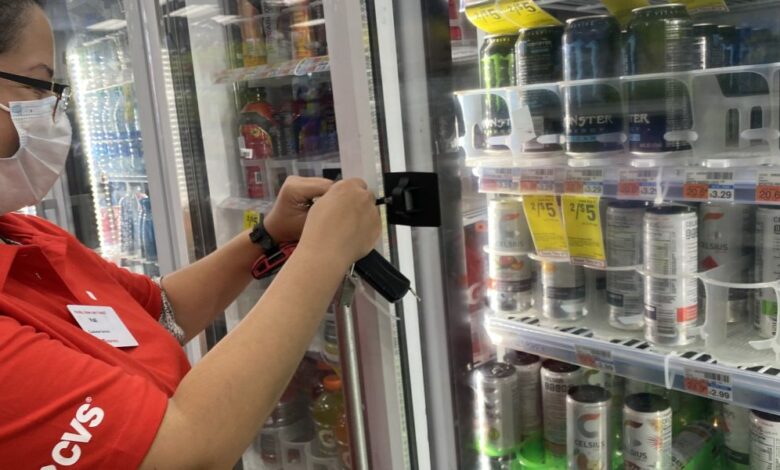EBay and CVS crime investigation ‘brothers’ take down retail thieves together by treating them like the mob


Christian Hardman has shuttered thousands of eBay accounts in the past decade as the online retailer’s lead on criminal investigations. One suspicious account, though, kept slipping through his fingers: a century-old pawnshop in Philadelphia.
Society Hill Loan looked like a legitimate retailer. Its eBay reviews were 99.6% positive. But Hardman had a hunch the steep discounts on commonly stolen items like Roomba vacuums, Gillette razor blades and Nicorette gum were just too good to be true.
EBay couldn’t legally compel the pawnshop to identify sellers. But around early 2022, Hardman caught a break from an unexpected ally: pharmacy chain CVS.
That’s because Hardman’s counterpart at CVS, Ben Dugan, had connected a group of repeat shoplifters at the chain to the pawnshop. When interrogated by Dugan and police officers, the thieves said they had stolen the goods from CVS and sold the merchandise to Society Hill Loan, which then posted it on eBay.
Hardman and Dugan realized this wasn’t a series of individual thefts or even some small-scale shoplifting scam. It was allegedly a multi-million-dollar — and multi-state — crime ring running through the pawnshop. And cracking the case required a more sophisticated approach to going after retail crime than shuttering stores or locking up deodorant behind plexiglass.
Society Hill Loan didn’t respond to numerous requests for comment. Law enforcement officials said the case is ongoing.
A 58-year-old investigator who lives near Orlando, Dugan has spent so many years in the industry that he’s become a sort of godfather of retail theft investigation in the US. He partnered with Hardman, a bearded 42-year-old from Salt Lake City, who uses eBay’s transaction records to help retailers battle what’s morphed into a drain on global businesses. In the US, estimated losses from organized retail crime, which vary wildly because it’s hard to measure, span roughly $4 billion a year to 10 times that.
These executives — from one of America’s largest retailers and one of the biggest online marketplaces — may have more experience taking down retail theft rings than anyone. Since joining forces 15 years ago, they’ve closed 600 cases. Their secret? Treating it like organized crime. They go after the kingpins — building cases using racketeering statutes once reserved for the mob and cartels.
“They steal for a living,” says Dugan, who is head of central investigations at CVS. “Put their kids through college.”
But even with their experience and close partnership — a rarity in the retail industry — Hardman and Dugan still face an uphill battle. They say that since the pandemic these crime rings are stealing more with increasing sophistication.
The store is just the first stop in a highly developed retail theft empire. People known as “boosters” snatch in-demand products, such as Olay moisturizers and Crest Whitestrips. They sell them for pennies on the dollar to a “fence,” a middleman between the boosters and the often unwitting buyers of stolen items. Savvier fences thoroughly clean the goods by removing labels, scratching out serial numbers and changing expiration dates. Then the items are posted on marketplaces like eBay, Amazon or Facebook.
As retail crime became used by some as a symbol of beleaguered, post-pandemic cities, attention focused on keeping theft out of stores. Retail executives, lobbying groups and politicians have called for stricter laws and tougher sentencing to make it easier to charge and imprison boosters. “There are bad laws across the country,” says Lisa LaBruno, senior executive vice president at the Retail Industry Leaders Association, a trade group.
But Dugan and Hardman say just focusing on the people who steal from stores can become a game of whack-a-mole. One team of boosters is easily replaced. And few professional thieves who work for retail crime rings know the thresholds that determine what’s a felony, meaning stricter laws are unlikely to dissuade them. “I’ve interviewed thousands of them and none of them have ever said, ‘I try to keep it under the felony level,’” Dugan says. “Nobody’s got a calculator out.”
Instead, the duo uses their perches at two major retailers to identify — and take down — the people running things. By teaming up, they can follow a retail crime ring from the pharmacy chain’s shelves to eBay’s checkout page.
It also helps that they know each other better than most colleagues. “I call him brother all the time,” Hardman says while sitting across from Dugan in a small conference room at eBay’s offices near Salt Lake City. “We talk about our kids and family. It’s not just a strict working relationship.” They reminisce about late night calls debating thorny cases and strategy sessions with bourbon and cigars.
“It’s for sure a brotherhood,” Dugan says.
In the early days of e-commerce, retailers blamed Amazon and eBay for enabling theft by providing a vast outlet to sell stolen goods. The marketplaces initially responded by insisting it’s not their job to screen where products come from.
Dugan and Hardman realized that to dismantle these crime rings, they had to sidestep these grievances and get organized. They got their teams talking almost weekly about investigations. CVS shares what’s happening on the ground, and eBay does the same for the web — a relationship that helps them cut through bureaucracy and speed things up. If CVS is working on a case and finds out eBay is involved, “that’s like gold,” Dugan says. “Because now we can call Christian and get this rockin’ and rollin’.”
That close relationship has also helped them win over state attorneys general and law enforcement officials, who historically categorized shoplifting as a low-priority crime.
$50 Million
Dugan’s work with Hardman, and other online marketplaces, helped prevent an estimated $50 million from being stolen at CVS locations in 2023, a record decrease, CVS says. That might not seem like a lot for a company that generated about $360 billion in sales last year, but retail is a low-margin business where every penny of profit counts.
Still, organized groups have pinched about $200 million from CVS stores each year since 2020 when Dugan says theft spiked during the pandemic across the chain’s roughly 9,000 locations.
That’s just a portion of the estimated $45 billion that crime networks steal from US retailers every year, Dugan says. That number is disputed, though. The National Retail Federation trade group retracted a report based on it last year. But Dugan stands by the figure, which he says was based on data collected by a trade association, the Coalition of Law Enforcement and Retail, he previously led.
As e-commerce boomed during the pandemic and supply chain disruptions caused shortages, common household goods like Clorox wipes and Tylenol were hawked for jacked-up prices. That drew more criminals, including existing crime syndicates that added retail theft to drug trafficking and other illicit operations, according to law enforcement officials.
Meanwhile, more chains said retail theft is hurting results and some blamed it for shutting stores.
The rising stakes have attracted federal authorities. “We’ve begun to sink our teeth into” it, says William S. Walker, special agent in charge of Homeland Security Investigations’ Philadelphia office. A lot of cases look like petty crime, but “behind the scenes, there are organized criminals involved.”
To better attack the problem, Dugan and Hardman say they need competitors to take a page from their partnership, including Amazon.com. Dugan has testified to Congress about Amazon’s lack of cooperation, which can hinder investigations since $700 billion of goods are sold on the web giant’s platform each year, roughly 10 times eBay’s total.
Amazon and other marketplaces see investigative requests as giving away private information, says Paul Jones, vice chairman of the Loss Prevention Foundation. Amazon typically requires retailers to provide a search warrant or subpoena up front to receive information about a suspicious account.
Retailers can find it hard to get police resources dedicated to organized theft, says Jones, who spent six years at eBay and expanded a program to use non-disclosure agreements to address privacy concerns without slowing down investigations. Then add Amazon’s reluctance to quickly hand over documents, and “by that time, the bad seller has closed down his site and opened a new one.”
Amazon has “referred thousands of organized retail crime bad actors to law enforcement,” leading to the dismantling of theft networks in the US and around the world, a spokesman said in a statement. “Amazon has zero tolerance for the sale of stolen goods.”
Closing In
As teams at CVS and eBay built a case against the Philadelphia pawnshop, they teamed up with other retailers, including Target and Walmart, after finding that Society Hill Loan’s boosters had hit additional chains. In early 2023, investigators presented their findings to law enforcement.
Months later in December, trucks pulled up outside the pawnshop. Agents wearing blue Homeland Security Investigations jackets raided the store, loading two-and-a-half cargo trucks full of allegedly stolen goods. Many of the items, including razor blades and over-the-counter medications, were still in the original packaging.
Other pawnshops in the city and in nearby Delaware had also been raided as part of the investigation, according to Dugan, Hardman and local media outlets. Homeland Security says the case is still being investigated and declined further comment.
Later that day, Hardman sat at his desk 2,000 miles away in Utah when the all-clear finally came. Society Hill’s eBay account had over two years allegedly sold an estimated $1.8 million worth of stolen goods traced to CVS.
An investigator had just one last request:
“Shut down the account.”
Source link




